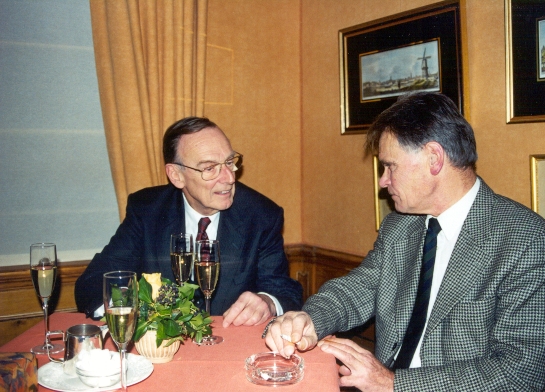Home > News > In memoriam Prof. dr. Theo Beemer
In memoriam Prof. dr. Theo Beemer
Last weekend the Dutch moral theologian Theo Beemer (right on the picture, in conversation with prof. de Grijs) died at the age of 75. Beemer was both a sympathizer of various kinds of liberation theology and a life-long student of Aquinas. He had influence on generations of theological and medical students in the Netherlands.
Theo Beemer was born in 1927. After his ordination in 1952 he taught moral theology at the Warmond Seminary and, from 1965 to 1992, at the Catholic University of Nijmegen. Next to teaching moral theology at the faculty of theology, he taught medical ethics at the faculty of medicine.Beemer was a great admirer of Thomas Aquinas and a critical member of the Thomas Instituut. He agreed with many theologians in the institute that Aquinas's pre-modern God-centered theology can function as an important correction to the subject-centered approach of modern theology. But he was critical to any reading of Aquinas that would forget the historical context of this medieval theologian, and any attempt to restoration theology.
As a student of Aquinas, Theo Beemer was fascinated by Aquinas's treatise on the passions of the soul. He (seems to have) inherited this fascination from his predecessors and passed it on to many of his students. Beemer combined his attention for the natural inclinations of human beings with a high sensitivity for oppression and marginalisation. Thus he sympathised with many forms of contextual theology in which homosexuality, and matters of gender and justice were put on the theological agenda.
A very good description of Theo Beemer's theology (including his approach to Aquinas) is given by his colleague Rinus Houdijk, 'Theologiseren in de nabijheid van de vreemdeling' in 'Theologie en Marginalisering', Rinus Houdijk ed. (Baarn: Gooi en Sticht, 1992) 11-26. This book also contains a list with Beemer's publications from 1956-1992.
Theo Beemer will be honoured by a special issue of the Dutch Tijdschrift voor Theology at the end of this year.
Carlo Leget
